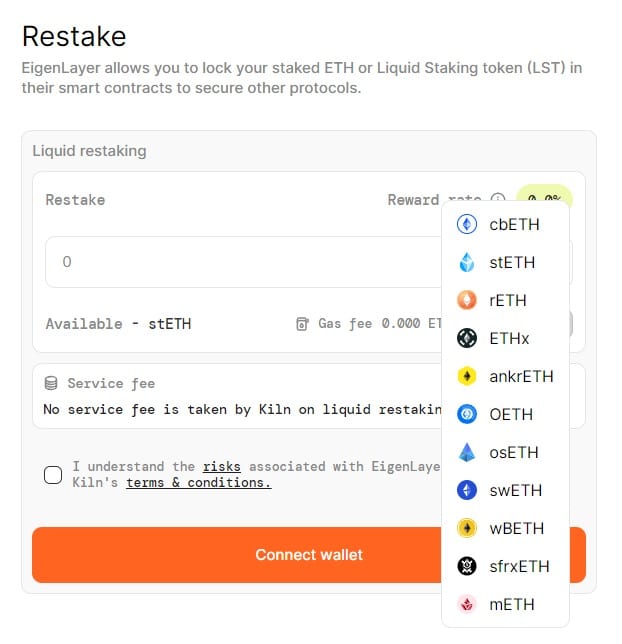Kiln, a French company specializing in staking, announces support for restaking Liquid Staking Tokens (LST) via the EigenLayer protocol. With this new feature, holders of Liquid Staking Tokens can now restake them via Kiln to earn points on EigenLayer, leader in the world of staking on over 30 blockchains.
Win rewards for restaking with Kiln
Kiln, a French company and leader in staking on over thirty blockchains, announces support for Liquid Staking Tokens (LST) restaking via the EigenLayer protocol.
Staking is a method of allocating crypto-currencies to validators in order to help secure a blockchain operating through proof-of-stake (PoS). Restaking, on the other hand, secures protocols on the EigenLayer network called Actively Validated Services (AVS).
In the case of Ethereum, it’s possible to be rewarded with Liquid Staking Tokens (LST) when depositing Ethers for staking on certain protocols such as Lido, Rocket Pool or Mantle.
These Liquid Staking Tokens, available at a 1:1 ratio to the number of corresponding tokens initially deposited, can then be restaked. Unlike staking, restaking does not involve the delegation of tokens per se, but rather the deposit of tokens in a dedicated smart contract.
- Staking of ETH ➜ Liquid Staking Token (stETH, mETH, rETH, swETH, etc.) ➜ EigenLayer
A new narrative in vogue, as evidenced by the total locked value (TVL) on EigenLayer since staking reopened on February 5. From around $2.1 billion, this figure has almost doubled at the time of writing to almost $4 billion.
And so, Kiln, a leading company in the staking ecosystem with 4% of all Ethers staked on its solution, offers restaking on its various integrations, namely Safe Wallet and the decentralized Kiln app.
Note that it is possible to restake your ETH on EigenLayer during a period running from February 5 to 9. This will enable you to earn points to potentially be rewarded via a future airdrop reserved for EigenLayer Restaking Points holders.
How to restake with Kiln?
Whether via Safe Wallet or Kiln’s dApp, the method for restaking your LSTs will always be the same, and is just a click away:
- Connect to the Kiln application via Safe Wallet or the Kiln dApp;
- In the “Restake” tab, select the LST of your choice and the amount you wish to restake;
- Accept the terms and conditions, click on “Restake” and confirm the transaction.
After depositing your LSTs in restaking via Kiln, you’ll be able to view your EigenLayer airdrop points from the “Rewards” interface.

Preview of the restaking interface from Kiln’s decentralized application
Using Kiln allows you to unify all your staking and restaking positions in a single interface, removing the need to run between each application. So, with just one click, you can monitor the various amounts staked through Kiln and the rewards linked to them. Note also that Kiln doesn’t charge any fees for restaking LST.
Last but not least, Kiln supports all LSTs accepted by EigenLayer, including stETH, rETH, cbETH, wBETH, swETH, ankrETH and mETH.
With regard to its roadmap, Kiln will launch a native ETH restaking solution for solo-stakers (in batches of 32) in February. This solution will then be extended to all users in March, enabling them to benefit from native restaking for any amount.
Kiln’s decentralized application is not only the simplest solution for staking your Ethers (in batches of 32 ETH), but also the cheapest on the market, offering 8% fees. What’s more, it’s permission-free and non-custodial.
Kiln is a leading provider of staking solutions to institutional players such as Ledger, Crypto.com and Trust Wallet, and has staked over $4 billion through its various solutions. At the time of writing, 4% of all ETH staked on the Ethereum blockchain are placed on Kiln, with over 39,500 validators and no slashing incidents to report.
